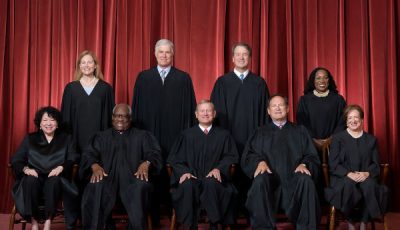The Appellate Court’s Ruling in the FOSTA Case Is a Beginning, Not an End
 WASHINGTON, D.C. – As I noted in a post published last Friday, the U.S. Court of Appeals for the D.C. Circuit has overturned the district court’s dismissal of a lawsuit challenging the constitutionality of the Allow States and Victims to Fight Online Sex Trafficking Act (FOSTA).
WASHINGTON, D.C. – As I noted in a post published last Friday, the U.S. Court of Appeals for the D.C. Circuit has overturned the district court’s dismissal of a lawsuit challenging the constitutionality of the Allow States and Victims to Fight Online Sex Trafficking Act (FOSTA).
While the court’s ruling is a positive development for those who oppose FOSTA and/or believe the statute has done more harm than good, it’s important to understand the appellate court didn’t weigh in on the larger question of whether FOSTA is constitutional – although it did pave the way for that question to be answered, a query that had been blunted by the district court’s earlier dismissal of the case.
When the district court dismissed the case, it did so because the court held that the plaintiffs in the case lack “standing” to challenge the law. Those plaintiffs include the Woodhull Freedom Foundation, Human Rights Watch, The Internet Archive, a licensed massage therapist named Eric Koszyk and Jesse Maley (AKA Alex Andrews), the co-founder, organizer, and director of several organizations and a website dedicated to advocating for sex workers’ health and safety. The district court found that none of the plaintiffs had demonstrated standing to sue under Article III of the Constitution. The appellate court disagreed – at least with respect to Andrews and Koszyk.
While the appellate court didn’t find that the other plaintiffs in the case have standing to sue, it’s important to understand that the court didn’t need to do so for the case to proceed. In other words, the appellate court didn’t find that Woodhull, Human Rights Watch and the others lacked standing; the court found that it didn’t need to consider that question at all.
As Judge Judith Rogers wrote in the decision: “Given identical claims by the other plaintiffs, the court need not decide whether additional plaintiffs have standing.”
Essentially, the appellate court disagrees with the district court over whether the plaintiffs had shown that the threat of FOSTA being enforced against them is “sufficiently imminent,” noting that under the relevant precedent “an actual arrest, prosecution, or other enforcement action is not a prerequisite to challenging the law.”
“Andrews has established an Article III injury-in-fact because she has alleged ‘an intention to engage in a course of conduct arguably affected with a constitutional interest, but proscribed by a statute, and there exists a credible threat of prosecution thereunder’,” Rogers wrote (internal citations omitted). “Her alleged conduct is ‘arguably affected with a constitutional interest,’ because Andrews’ intended future conduct involves speech.”
“Andrews operates a website that allows sex workers to share information,” Rogers continued. “Her conduct is ‘arguably proscribed’ by FOSTA because it is a crime to own, manage, or operate an ‘interactive computer service’ with the intent to ‘promote or facilitate the prostitution of another person.’ FOSTA does not define ‘promote’ or ‘facilitate,’ nor does it specify what constitutes ‘prostitution,’ a term undefined by federal law. Nor are these terms limited by a string of adjacent verbs (such as advertises, distributes, or solicits) that would convey ‘a transactional connotation’ that might narrow the statute’s reach.”
“In short, the court need not read FOSTA to encompass advocacy or educational activities to hold that Andrews has standing,” Rogers wrote. “Because Andrews’ website allows sex workers to share information about online payment processors like PayPal, Andrews has alleged ‘some desired conduct… that might trigger an enforcement action.’ That Andrews’ intended conduct is unlike the intentional measures taken by Backpage.com to help online sex traffickers avoid detection by law enforcement, even assuming Backpage.com was a motivating consideration behind FOSTA’s enactment, does not mean that Andrews’ conduct falls outside FOSTA’s scope. FOSTA’s text does not limit its scope to ‘bad-actor websites,’ or even to classified advertising websites.”
The appellate court held that Koszyk had established Article III standing as well, finding that his injury-in-fact is “fairly traceable to the passage of FOSTA and ‘not… the result [of] the independent action of some third party not before the court’,” Rogers wrote, noting that “Craigslist removed Koszyk’s advertisements and ‘shut down its Therapeutic Services section in response to FOSTA’s passage,’ and Koszyk alleges that he has not been able to post on Craigslist since, thereby drying up his client base.”
There’s much more to the ruling with respect to both Andrews and Koszyk, which you can read by reviewing the court’s full decision, including a partial concurrence with the majority’s opinion by Judge Gregory Katsas. The most important thing to understand about the appellate court’s decision, though, is that rather than settle any of the constitutional questions at play in the lawsuit, the decision has cleared the path for the lower court to now hear those arguments in full.
Or, as Rogers put it in the decision: “Accordingly, because Andrews and Koszyk have established their Article III standing to bring a pre enforcement challenge to FOSTA — Andrews has alleged intended conduct that is arguably proscribed by FOSTA and the threat of future enforcement is substantial, while Koszyk has demonstrated that a favorable decision would create a significant increase in likelihood that he would obtain relief — we reverse the order dismissing the complaint for lack of subject-matter jurisdiction and remand the case to the district court for further proceedings.”













